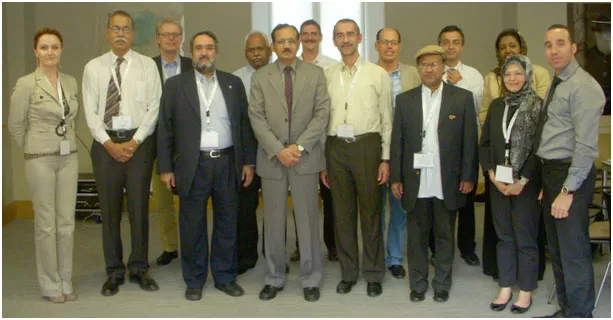Environmental Cost and Changing Face of Agriculture in the Gulf States
11 يوليو 2012
3rd Gulf Research Meeting July 2012
ICBA played a leading role in planning and conducting the agriculture workshop of the 3rd Gulf Research Meeting, which was held on 11-14 July 2012 at the University of Cambridge. The Gulf Research Center in Cambridge (GRCC) brought together 450 distinguished scientists and policy makers from 46 countries to participate in 19 workshops. The agriculture workshop chaired by Dr Shabbir A. Shahid (Senior Scientist at ICBA), was attended by participants from Australia, Bahrain, India, Kuwait, Oman, Saudi Arabia, Turkey, UAE, Australia, UK, and Morocco. The agriculture workshop covered the topics of food security, improved water-use efficiency, specific country case studies and the changing role of agriculture in the Gulf countries.
H.E. Maj. Gen. Abdullatif Rashid Al-Zayani, the Secretary-General of the Gulf Cooperation Council, delivered the opening session of the 2012 Gulf Research Meeting. As Lead Workshop Director, Dr Shabbir A. Shahid jointly with Dr Mushtaque Ahmed, the Director of the Affiliation Center for Environmental Studies and Research (CESAR) presented the welcome keynote address, the Environmental Cost and Changing Face of Agriculture in the Gulf States. Dr Shahid identified the challenges to food security and outlined the research and development undertaken by ICBA over the last twelve years to help the Gulf countries to resolve these challenges.
Dr Shahid identified the challenges to food security and outlined the research and development undertaken by ICBA over the last twelve years to help the Gulf countries to resolve these challenges.
Workshop participants collaborated to produce the following recommendations:

Workshop participants with Dr Abdul Aziz Sager Chairman Gulf Research Center
These recommendations and background material will form the basis of the proposed book, which will be edited by Dr Shahid. On behalf of ICBA, Dr Shahid will continue to collaborate, wherever possible, with the GRCC to fulfil its role to advance education and research on political, economic, social and security issues relating to member countries of the Gulf Cooperation Council and associated countries including Iran, Iraq and Yemen.
ICBA played a leading role in planning and conducting the agriculture workshop of the 3rd Gulf Research Meeting, which was held on 11-14 July 2012 at the University of Cambridge. The Gulf Research Center in Cambridge (GRCC) brought together 450 distinguished scientists and policy makers from 46 countries to participate in 19 workshops. The agriculture workshop chaired by Dr Shabbir A. Shahid (Senior Scientist at ICBA), was attended by participants from Australia, Bahrain, India, Kuwait, Oman, Saudi Arabia, Turkey, UAE, Australia, UK, and Morocco. The agriculture workshop covered the topics of food security, improved water-use efficiency, specific country case studies and the changing role of agriculture in the Gulf countries.
H.E. Maj. Gen. Abdullatif Rashid Al-Zayani, the Secretary-General of the Gulf Cooperation Council, delivered the opening session of the 2012 Gulf Research Meeting. As Lead Workshop Director, Dr Shabbir A. Shahid jointly with Dr Mushtaque Ahmed, the Director of the Affiliation Center for Environmental Studies and Research (CESAR) presented the welcome keynote address, the Environmental Cost and Changing Face of Agriculture in the Gulf States.
 Dr Shahid identified the challenges to food security and outlined the research and development undertaken by ICBA over the last twelve years to help the Gulf countries to resolve these challenges.
Dr Shahid identified the challenges to food security and outlined the research and development undertaken by ICBA over the last twelve years to help the Gulf countries to resolve these challenges. Workshop participants collaborated to produce the following recommendations:
- Create “ Gulf Agriculture Network for Knowledge Sharing and Technology Adoption” GANKSTA.
- Increase investment in Research, Development and Extension in the agriculture sector.
- Adopt climate-smart technologies and practices in agricultural intensification for food security enhancement.
- Increase strategic groundwater reserve through recharge using reclaimed water.
- Invest in the use of reclaimed water in protected agriculture and enhance the social acceptance of this alternative by education and awareness campaigns.
- Educate consumers on the positive impacts of reducing meat-based food products in order to help reducing food imports; mitigating climate change and managing sustainably water resources.
- Adopt options for the Gulf States food security through the involvement of host countries smallholder farmers in the foreign land deals.
- Orient the Gulf investors either by Lobbying or incentive to lease unutilized land within the framework of foreign land deals. Policy-makers need to be more fully cognizant of, and responsive to, the problems of current land deal strategies and the risks these create and the difficulties these strategies present in achieving reliable long-term food supplies.
- Policy-makers should research and establish alternative investment structures and mechanisms to achieve long term food security goals -- such as reliable sources of staples from the agricultural sectors of less-developed countries.
- Enhance and stimulate quality local food production and its competitiveness by adopting modern technologies such as soilless and hydroponic growing systems in order to maximize the market share for local products.

Workshop participants with Dr Abdul Aziz Sager Chairman Gulf Research Center
These recommendations and background material will form the basis of the proposed book, which will be edited by Dr Shahid. On behalf of ICBA, Dr Shahid will continue to collaborate, wherever possible, with the GRCC to fulfil its role to advance education and research on political, economic, social and security issues relating to member countries of the Gulf Cooperation Council and associated countries including Iran, Iraq and Yemen.









